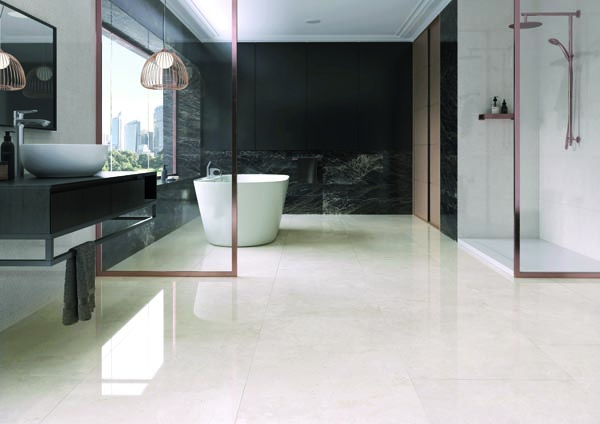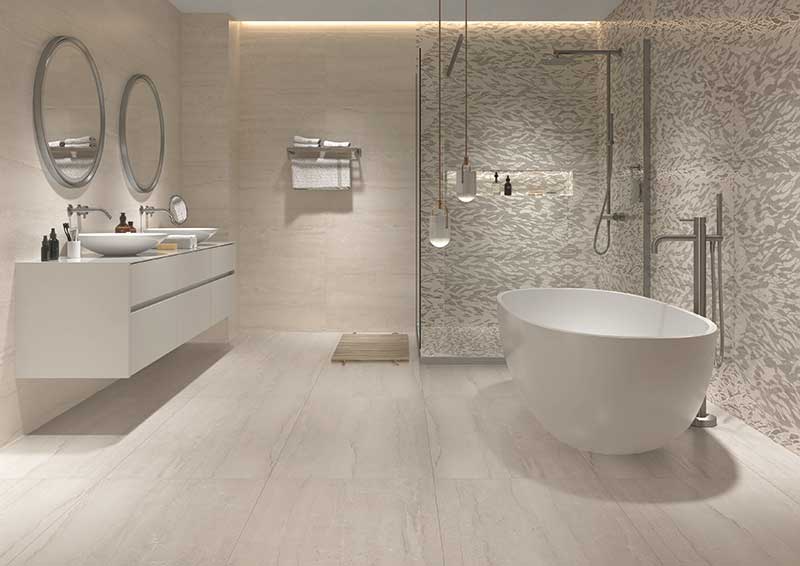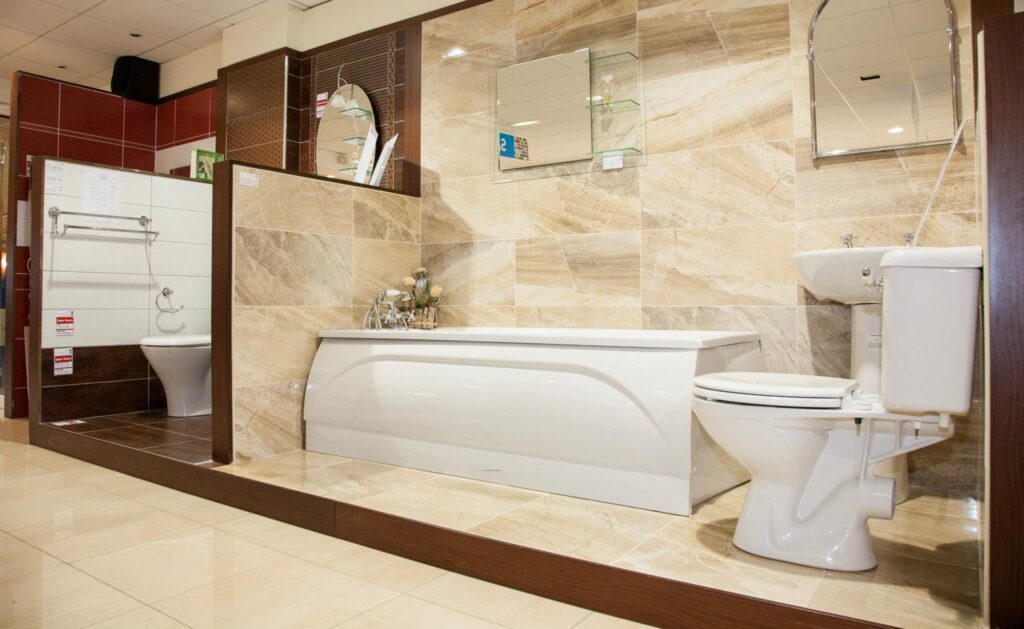So, you’re staring at that pile of leftover floor tiles and wondering if you can slap them up on your shower wall?
It’s a fair question and one that’s crossed the minds of many a DIY enthusiast and homeowner.
Let’s dive into the nitty-gritty of using floor tiles on shower walls, so you can make an informed decision that won’t have you cursing your tiles later.

What Are Floor Tiles and Wall Tiles?
Before we get into the thick of it, let’s clear up what floor tiles and wall tiles are all about.
Floor Tiles: These bad boys are built tough to handle foot traffic. They’re thicker, denser, and generally more durable. Think of them as the rugby players of the tile world.
Wall Tiles: Lighter, thinner, and often more decorative, wall tiles are the show ponies. They don’t need to handle heavy weights but do need to look good while doing their job on vertical surfaces.
Can You Use Floor Tiles on a Shower Wall?
Short answer: Yes, but there are a few things to consider. Let’s break it down with some pros and cons.
Pros of Using Floor Tiles on Shower Walls
Durability: When it comes to durability, floor tiles are truly impressive. They are specifically engineered to withstand heavy use, making them an excellent option for areas that are prone to moisture, such as showers. These products are built to last, able to handle rigorous use and regular cleaning without any noticeable damage.
Looks: When it comes to floor tiles, the options are endless. From an array of captivating designs to a wide range of vibrant colours and exquisite finishes, there is something to suit every aesthetic preference. Adding a touch of diversity can bring a one-of-a-kind and opulent appearance to your shower. With a wide range of choices available, you can easily design a breathtaking bathroom space that suits your style preferences. Whether you prefer sleek modern styles or rustic finishes, the possibilities are endless.
Water Resistance: A lot of floor tiles are designed to withstand water, which is definitely a positive feature when it comes to using them in a shower. One great feature of these shower walls is their ability to maintain their integrity, effectively preventing any water from seeping through and causing any potential damage.

Cons of Using Floor Tiles on Shower Walls
Weight: When it comes to weight, floor tiles can pose a challenge when installing them on walls due to their heavier nature. If you want to ensure a secure and long-lasting installation, it’s important to use a high-quality adhesive and consider providing extra support for your wall. In older homes, the weight of tiles can be a crucial consideration, particularly if the walls were not built to handle heavy loads.
Installation Challenges: Securing heavy tiles on a vertical surface can be quite challenging and requires skill and experience. When it comes to this process, precision and patience are key. It’s crucial to ensure that the tiles are aligned just right and securely fixed to avoid any slipping or falling mishaps.
Potential for Damage: Improper installation of heavy tiles can lead to gradual wall damage. When there’s extra weight, it can put a lot of strain on the wall structure. This can cause cracks to form or even result in tiles coming loose if they’re not adequately supported.
Advantages of Using Floor Tiles on Shower Walls
Despite the challenges, there are definite perks to using floor tiles on your shower walls.
Durability: They can handle a lot of wear and tear, making them ideal for a high-moisture environment like a shower. Floor tiles are typically more robust than wall tiles, ensuring they stand the test of time even in the wettest conditions.
Aesthetic Appeal: Floor tiles come in a range of styles and finishes that can give your shower a high-end, unique look. Whether you prefer the natural look of stone, the sleekness of polished porcelain, or the warmth of wood-look tiles, there’s a floor tile to suit your design vision.
Water Resistance: Many floor tiles are designed to be water-resistant, which helps in maintaining the integrity of your shower walls. This is particularly important in a shower environment where tiles are constantly exposed to water and humidity.
Potential Issues with Using Floor Tiles on Shower Walls
Now for the less rosy side of things.
Weight Considerations: Floor tiles are heavy. Your walls need to be able to support this added weight, and you’ll need a strong adhesive to keep them in place. This might also require additional support, such as reinforcing the wall studs or using a stronger mortar mix.
Installation Challenges: Precision is key here. Floor tiles require a skilled hand to ensure they are installed correctly and securely. Uneven tiles can lead to water seepage and potential damage, so it’s crucial to get the installation right the first time.
Potential for Damage: If not installed properly, the weight of the tiles can cause damage to the walls over time. Cracks, loose tiles, and even wall damage are possible if the installation is not done correctly. This is why it’s often recommended to hire a professional for such projects.

Expert Tips for Using Floor Tiles on Shower Walls
If you’re set on using floor tiles for your shower walls, here are some expert tips to make the process smoother.
Choose the Right Type: Not all floor tiles are suitable for wall installation. Look for porcelain tiles, which are dense and have low water absorption rates. These tiles are ideal for wet environments like showers.
Proper Installation: Ensure the wall surface is well-prepped and use a high-quality adhesive. It’s often best to hire a professional for the installation. Professionals have the experience and tools to ensure the tiles are installed securely and properly aligned.
Ensure Waterproofing: Proper waterproofing is essential to prevent water from seeping behind the tiles and causing damage. Use a waterproof membrane on the wall before tiling, and ensure all grout lines are sealed properly.
Plan the Layout: Plan the layout before starting the installation. This includes measuring the walls, cutting the tiles to fit around fixtures, and ensuring the design aligns with your vision. A well-planned layout can save time and prevent mistakes during installation.
Alternatives to Using Floor Tiles on Shower Walls
While using floor tiles on shower walls can work, there are other options that might suit your needs better.
Ceramic Wall Tiles: Specifically designed for vertical installation, these tiles are lighter and easier to work with. They come in a variety of designs, making it easy to find a style that fits your bathroom’s aesthetic.
Glass Tiles: Modern and sleek, glass tiles are water-resistant and easy to clean. They can add a bright, reflective quality to your shower, making the space feel larger and more open.
Mosaic Tiles: Perfect for adding a decorative touch, mosaic tiles come in various materials, including glass, ceramic, and stone. They can be used to create intricate patterns and designs, adding a unique flair to your shower.
Ceramic City offers a wide range of wall tiles that cater to different tastes and preferences. From ceramic to glass, you’ll find the perfect tiles to suit your shower space.

Internal Linking to Related Content
For a deeper dive into DIY tiling projects, check out How to Put Ceramic Tile on Bathroom Floor: A Complete DIY Guide. If you’re pondering the best colours for your bathroom tiles, Best Tile Colours for Small Bathrooms: The Ultimate Guide offers excellent advice. For inspiration on the latest trends, have a look at Most Popular Bathroom Tile.
Conclusion
Using floor tiles on a shower wall is doable and can add a unique touch to your bathroom. However, it comes with its own set of challenges. Ensuring proper installation and choosing the right type of floor tiles are crucial steps. As Ireland’s premium tile outlet, Ceramic City offers an extensive range of both floor and wall tiles, making it easy for you to find the perfect match for your project.
Ready to transform your shower space? Check out Ceramic City’s collection of wall and floor tiles and start planning your dream bathroom today!
